| Hockey legend Balbir Singh Sr. Passes Away at 96 |
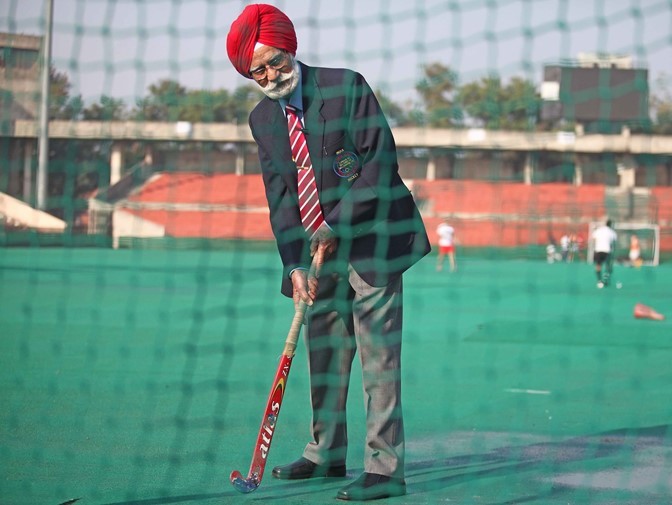
Article by Nitin Sharma, Photo by Kameshvar Singh, courtesy
The Indian Express
 riple
Olympic gold medallist Balbir Singh Sr. breathed his last at a Mohali
hospital on Monday, 25th May at 6:17 am. He was 96. Balbir Sr., who was
member of the 1948 London Olympics gold medal-winning Indian hockey
team, vice-captain of the 1952 victorious side and skipper of the 1956
champions, had been admitted to the hospital on May 8 due to pneumonia
and was on ventilator support. riple
Olympic gold medallist Balbir Singh Sr. breathed his last at a Mohali
hospital on Monday, 25th May at 6:17 am. He was 96. Balbir Sr., who was
member of the 1948 London Olympics gold medal-winning Indian hockey
team, vice-captain of the 1952 victorious side and skipper of the 1956
champions, had been admitted to the hospital on May 8 due to pneumonia
and was on ventilator support.
Balbir Singh Dosanjh was called Senior to differentiate him
from five other Balbirs who played hockey for India in later years. He
was the oldest surviving Olympic medallist from India, a record which
now passes on to his 1948 London Olympics teammate Keshav Dutt.
Born on December 31, 1923 to Sardar Dalip Singh and Karam Kaur at his
maternal village of Haripur Khalsa, Balbir Sr. went on to become one of
the best centre forwards India has produced. As a five-year-old, Balbir
Sr. was given a hockey stick by his freedom fighter father. He started
his career as a goalkeeper with his school team at Moga, before playing
as a defender and later a centre-forward.
He initially played for Sikh National College, Lahore in the early
1940s before making the switch to Khalsa College, Amritsar in 1942 on
the insistence of his long-time coach Harbail Singh. He captained Punjab
University to three All India Inter-University titles in 1943, 1944 and
1945 before playing for undivided Punjab in the national championships
of 1947 before partition.
Balbir Sr. was not among the original list of players for the
training camp for 1948 Olympics, but was later included in the Indian
squad of 20 players. He was one of four centre forwards in the team. He
scored six goals, including a hat-trick, against Argentina in India's
9-1 win in his first and India's second game in the tournament. He was not included in the
quarterfinal against Spain, and semifinal against the Netherlands.
In the final against Great Britain in a front of a 25,000 crowd at
Wembley Stadium in London, Balbir Sr. scored India's first goal in the
seventh minute and the second in the 15th minute. Tarlochan Singh Bawa
and Pat Jensen scored the other two goals as India won the final 4-0. It
was the first time that the Indian flag was unfurled in a sporting event
in England.
"Seeing the Tri-colour unfurl at the Wembley Stadium in England after
our victory was like flying on the clouds of joy. I can never forget the
moment. It remains the biggest memory of my sporting life," he had
told The Indian Express in 2018.
Balbir Sr. was the vice-captain of the Indian team led by K. D. Singh
'Babu' at the 1952 Helsinki Olympics. The centre-forward scored three
goals against Great Britain in the semifinal before scoring five out of
the six goals against the Netherlands in the final, a record which
stands till now.
At the 1956 Melbourne Olympics, Balbir Sr., now the captain of the
team, scored five goals against Afghanistan in India's opening match
before being injured. He played in the semifinal against Germany and
final against Pakistan with an injured right hand, as India won their
sixth Olympic gold medal.
Post his playing days, Balbir Sr. was the chief coach or manager of
the Indian team, in which role he won the gold at the 1975 Hockey World
Cup, silver at the 1982 Asian Games and bronze at the 1982 Champions
Trophy.
|
| Balbir Singh Sr.: His Hockey Stick Was A Magician's Wand |
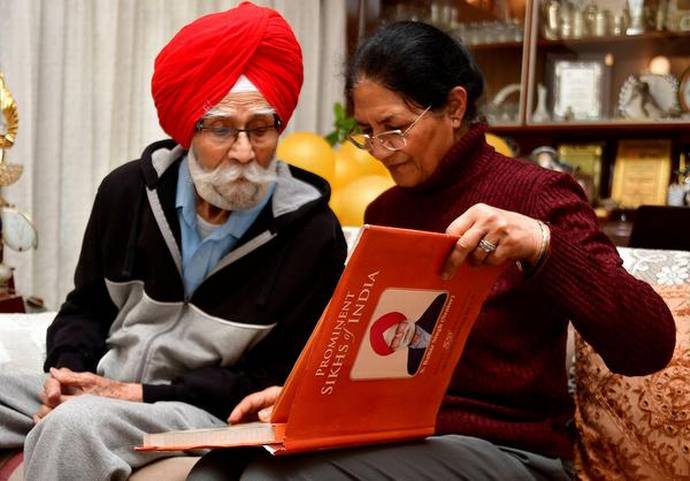
Balbir Singh Sr. with his daughter Sushbir at her residence in Chandigadh
Article by Vijay Lokapally, Photo by Akhilesh Kumar, courtesy
Sportstar
 he
hands that once held the hockey stick firmly, guiding the ball,
caressing or slamming it, leaving the opponents chasing his shadow,
trembled to hold a pen as he bravely tried to scribble his name. Giving
an autograph seemed such an arduous task for Balbir Singh Sr.,
who could once produce a goal from nowhere. he
hands that once held the hockey stick firmly, guiding the ball,
caressing or slamming it, leaving the opponents chasing his shadow,
trembled to hold a pen as he bravely tried to scribble his name. Giving
an autograph seemed such an arduous task for Balbir Singh Sr.,
who could once produce a goal from nowhere.
His frail
figure was proof of the world having whizzed by, time leaving its mark
on this wonderful athlete, who dazzled on the hockey field like none
other, with the glorious exception of Dhyan Chand.
Polite to a fault, Balbir Sr. sported an infectious smile. His warm
hug created such positive vibes about a man who spent his life helping
fellow sportsmen, his upright character a testimony to the values that
underlined his commitment to his team and nation.
In his debut match at the Olympics, he scored six goals against Argentina,
including a hat-trick. His next match, the final against host Great Britain was a
thriller. Kishan Lal and K. D. Singh 'Babu' played barefoot after it
rained. And India won 4-0, with Balbir Sr. scoring the first two goals.
The Indian team was accorded a red-carpet welcome in Bombay on their return.
In Delhi, the team was feted by Prime Minister Jawaharlal Nehru. Balbir Sr.
would often recall those memorable days of hockey being the "darling
sport" of the nation. It is said that Balbir Sr. and "Flying Sikh" Milkha
Singh never required an appointment to meet the Prime Minister. "It's
true. We could meet the prime minister at short notice. He loved hockey," Balbir Sr.
told this writer once.
It was memorable meeting this legend at his home in Chandigarh in
February 2019. The place was a virtual hockey museum, and one soaked
in tales from India's glorious domination of the game. The National
Flag in his room was a constant reminder of the momentous occasion in
1948 London, when he took pride in "mastering the master", Great Britain.
Independent India celebrated the hockey gold on English soil, and he
could relive every moment of that epic contest with minute details.
His speech was a mumble. You had to sit close because he had also
become hard of hearing. He was emotionally attached to the game. A hockey defeat would result
in Balbir Sr giving his meal a miss. Family members often hid the news
of India's loss from him.
On one of the trips to his house, some of us expressed our desire to
"feel" the gold medals. He pulled them out of his treasure box and let
us hold them. "Can you feel the current?" His eyes were moist.
In his death, Balbir Sr took away with him a large chunk of hockey
history, documented only in his mind. He was a kind soul, who served
Indian hockey with distinction, and remained its most loyal supporter
even in times of acute distress. He always advocated hope for Indian hockey.
In "The Golden Hat Trick", his captivating autobiography, he documents
his attachment to the game. "Our love
blossomed in London. We married in Helsinki and honeymooned in
Melbourne. After a period of 11 long years (from the 1964 Tokyo
Olympics), she returned to me as fresh, as gay, as charming as she ever
was. This time she took me to Kuala Lumpur and we were again top of the
world. I am waiting for her, my hockey fairy."
Alas, his yearning for another date with the hockey fairy shall
remain an unfulfilled dream.
|
| Balbir Singh Sr. - Always A Star Among The Stars |
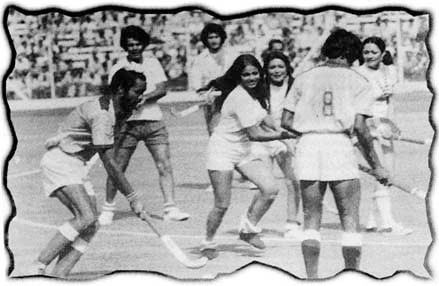
Article by Nandakumar Marar, courtesy
Sportstar
 albir
Singh Sr. was part of three gold medal-winning Olympic teams before
taking over as the manager of the national team. He played and managed
at a time when hockey players were treated as celebrities by the movie
world, and were invited to post-win felicitations and asked to play
exhibition games with the reel stars. albir
Singh Sr. was part of three gold medal-winning Olympic teams before
taking over as the manager of the national team. He played and managed
at a time when hockey players were treated as celebrities by the movie
world, and were invited to post-win felicitations and asked to play
exhibition games with the reel stars.
Balbir Sr.'s two goals in India's 4-0 rout of home team Great Britain
in the 1948 London Olympic Games hockey final resulted in newly
independent India erupting in joy. After winning two more Olympic golds
(1952 Helsinki and 1956 Melbourne), Balbir helmed India's only World Cup
Hockey title win in Kuala Lumpur in 1975.
Amidst a series of felicitations nationwide, one unique event stood
out. The late Raj Kapoor invited Team India, captained by midfielder
Ajitpal Singh, to Mumbai, for an exhibition match against the film
world. The world champions took on hockey-stick wielding actors and
actresses on a makeshift pitch at the Wankhede stadium. The squad under
Balbir Sr. was also invited to a grand reception at the thespian's
farmhouse.
India captain Ajitpal Singh recalls: "Raj Kapoor was a great fan of
sports. He invited our team to a Baisakhi function and we visited his
farmhouse. We played with a team of 11, they were 20, actors and
actresses coming in and going out. It was an exhibition tie for fans to
enjoy." Balbir Sr., as team manager, was present at the Wankhede and
watched with pride as his heroes enjoyed fame and adulation.
Hockey was the pride of Indian sport then, so playing under a manager
with a lifetime of achievements was Ajitpal's career-high. "Sir brought
out the best in his players," said the captain about Balbir Sr., whose
life story later was woven into the movie "Gold", based on the 1948
Olympics triumph.
On that day at the Wankhede, the manager watched his players showcase
their skills against artists of another craft. Ajitpal Singh recalls
Dara Singh, Danny Denzongpa, Navin Nishcol, Prem Chopra, Asrani and
Randhir Kapoor among actors on the pitch.
Mumbai's Onkar Singh, a World Cup-winning team member, whose personal
album includes images from the Wankhede exhibition tie, says: "Hockey
drew packed crowds across the nation. India players had fans everywhere,
the public followed the sport closely." Onkar recalls the names of
Rakhee and Bindu among the actresses present for the festivities.
|
| Pandanda Kuttappa, Founder of the Kodava Hockey Festival, Passes Away |
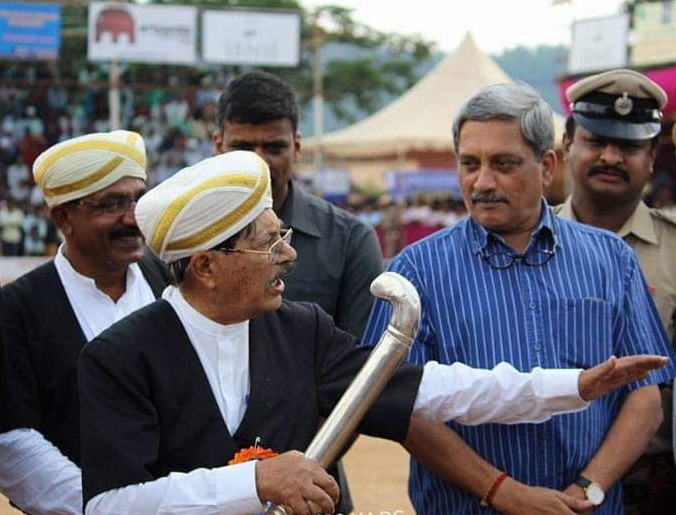
By Pratap Simha, MP, Mysuru-Kodagu constituency, published in
Star of Mysore
 andanda
Kuttappa, fondly called Kuttani by his near and dear ones, was the brain
behind 'Kodava Hockey Namme' or Kodava Hockey Festival. This
festival is now recognised as one of the largest field hockey
tournaments in the world. Pandanda Kuttappa breathed his last on
Thursday, 7th May, 2020. The name of Pandanda Kuttappa will remain in
the history books as long as hockey is played in India. andanda
Kuttappa, fondly called Kuttani by his near and dear ones, was the brain
behind 'Kodava Hockey Namme' or Kodava Hockey Festival. This
festival is now recognised as one of the largest field hockey
tournaments in the world. Pandanda Kuttappa breathed his last on
Thursday, 7th May, 2020. The name of Pandanda Kuttappa will remain in
the history books as long as hockey is played in India.
Pandanda Kuttappa was working as a bank officer. In 1997, he
organised a hockey tournament for the first time in Kodagu, and 60 teams
participated in that year's 'Pandanda Cup'. The number of participating teams
increased every year. His name has been featured in the Limca Book of
Records for being instrumental in starting the Kodava Family Hockey
Tournament.
This hockey tournament is held every year in Kodagu district in the
month of April and May. Each year this hockey festival is organised by
one of the Kodava families, and the tournament is named after the
organising family.
In 2003, this hockey festival saw the participation of the highest
number of 280 teams in the Kaliyanda Cup held at Napoklu.
Over the years, this popular sport event has greatly influenced the
lives of Kodavas. This has become a motivating factor for those who are
willing to join Indian Army. Every year, professional teams from
different parts of the country eagerly wait to watch this hockey
festival.
During the British rule, hockey was a popular game of Kodavas. The
Kodava clan has a long history of association with the game of hockey.
The list of national-level players from Kodagu region including
Maleyanda Muthappa, Paikera Kalaiah, 'The Wall' Anjaparavanda Subbaiah,
former captains such as Govinda, Mollera P. Ganesh, Maneyapanda Somaiah
and Arjun Halappa, Olympian Cheppudira Poonacha, coach Koothanda
Poonacha, penalty corner specialist Ballachanda Len Ayyappa, Palanganda
Amar Ayyamma, Raghunath, S. V. Sunil, and promising players such as
Nikkin Thimmaiah, Alemada Cheeyanna, Sannuvanda K. Uthappa, and the list
goes on and on.
You name any major hockey team in India, and there would be at least
one Kodava in the eleven-member team. In State hockey clubs, one would
certainly find either an Appanna or a Bopanna.
There goes a saying: If you throw a stone in Kodagu district, it will
either hit a soldier or a hockey player. Hockey is like a religion in
Kodagu, and each Kodava home has a traditional gun, as well as a couple
of hockey sticks.
All the major towns in Kodagu have at least one hockey club in their
area. 'Blue Star' of Madikeri, 'Dolphin' and 'Wanderers' of Somvarpet,
'Towers' of Virajpet, 'Shivaji' of Gonikoppal, 'BBC' of Gonikoppal,
'Sports Club' of Ammathi are the names of a few hockey clubs in Kodagu
district.
Here is an interesting fact: It is said that both Field Marshal
Kodandera M. Cariappa and General Kodandera S. Thimayya caught the
attention of British because of their keen interest in hockey.
All credit to Pandanda Kuttappa for starting the Kodava Hockey
Festival, which showcases that for the Kodava clan, hockey is just not a
game but part of their culture.
|
| Photograph of the Month |
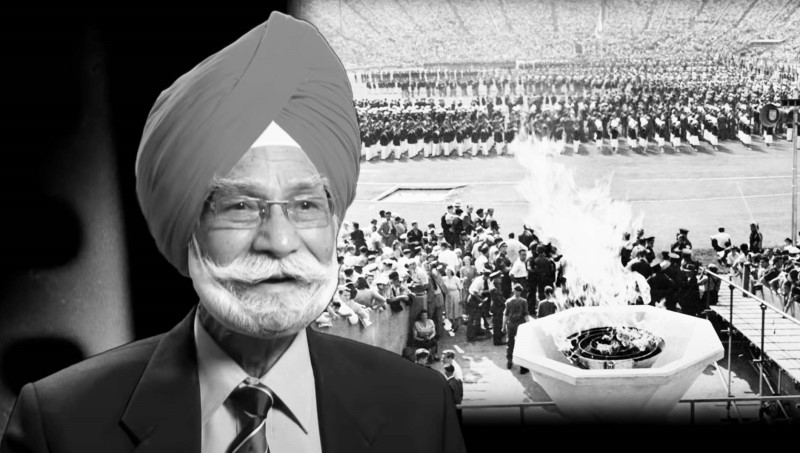
Photograph and Article copyright The Olympic Channel
 hree-time
Olympic gold medallist in hockey, Balbir Singh Sr., 96, passed away on
Monday, 25th May, 2020. He had battled with multiple health complications
in the past fortnight. hree-time
Olympic gold medallist in hockey, Balbir Singh Sr., 96, passed away on
Monday, 25th May, 2020. He had battled with multiple health complications
in the past fortnight.
Balbir Singh Sr. is considered to be one of the finest forwards to
have ever graced the game, and his inspirational leadership helped
Indian hockey win their hat-trick of Olympic golds in 1948, 1952 and
1956.
He scored in both the 1948 and 1952 Olympics finals, and his five
goals against the Netherlands in the latter still stands as the record
for most goals scored in a men's Olympic final.
In the 1956 Olympics final against Pakistan, the Indian hockey
legend played through a fracture in his favoured right hand to guide
them to a 1-0 victory and ensure a sixth consecutive gold medal.
Balbir Singh Sr. later went on to become the coach of the Indian
hockey team, and inspired them to a bronze medal at the inaugural 1971
World Cup before being at the helm for the country's only World Cup
victory in 1975.
|
| Money Matters |
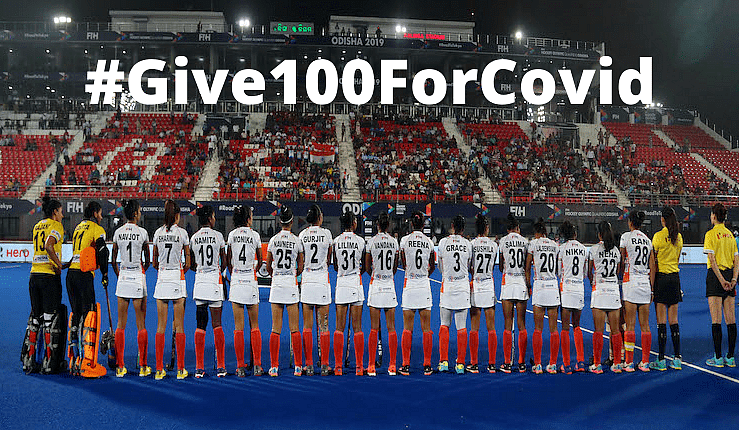
 he
Indian women's hockey team's online fund-raiser Food for All on
Ketto.org raised funds of over ₹21 lakh (over
$28,000) from 451 supporters to help in the fight against the
COVID-19 pandemic. he
Indian women's hockey team's online fund-raiser Food for All on
Ketto.org raised funds of over ₹21 lakh (over
$28,000) from 451 supporters to help in the fight against the
COVID-19 pandemic.
The online campaign, which ran from 17th April to 3rd May, involved team members
coming up with different fitness tasks that ranged from lunges to squats to pushups, and more.
Each day a player gave a new challenge and tagged 10 people on their
social media handles to take up the challenge and donate ₹100 to
the fundraiser.
The funds have been donated to Delhi-based NGO Uday
Foundation... The funds will be used to provide basic necessities like
dry rations, soap and sanitisers for patients,
migrant workers and slum dwellers.
"The response we have received was really overwhelming. People,
especially Indian hockey lovers from across the globe took part in the
challenge and contributed to the cause. On behalf of the Indian women's
team, I would like to thank everyone who participated in this initiative to
help the poor," India skipper Rani Rampal said.
Hockey India President Mohammad Mushtaque Ahmad said: "It is very
heartening to see the Indian women's hockey team take up such a
thoughtful initiative. I have been informed that hundreds of people have
already benefitted from this cause, and this makes us extremely proud of
the players. The team has shown that sports people have a big heart and
come forward to help when needed."
|
| Media Matters |
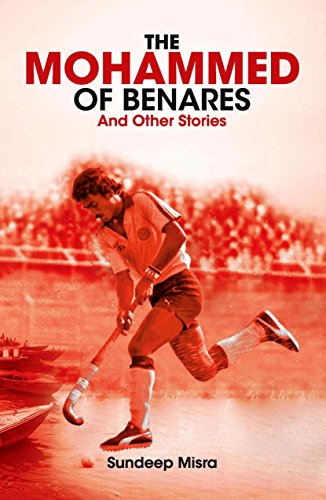
Reviewed by Vikrant Parmar of
The Tribune
 n
a cricket-crazy nation, there are only a handful who are attached to our
national game - hockey. Leading the pack is journalist-author Sundeep
Misra, who in his collection of articles titled The Mohammed of
Benares And Other Stories, delves deep into the world of hockey
and comes out with pearls that will forever be prized by the ones who
love the game. n
a cricket-crazy nation, there are only a handful who are attached to our
national game - hockey. Leading the pack is journalist-author Sundeep
Misra, who in his collection of articles titled The Mohammed of
Benares And Other Stories, delves deep into the world of hockey
and comes out with pearls that will forever be prized by the ones who
love the game.
Starting from India's thrashing at the hands of Pakistan in the 1982
Asian Games, to the gradual resurgence and eventual triumph at the
Junior World Cup in 2016, the author has covered hockey from various
perspectives - be it players, coaches, support staff or the
political angles involved.
So while there are interesting stories related to stars like Mohammed
Shahid, "whose wrists worked like a windmill", Dhanraj Pillai, Dilip
Tirkey, Rajiv Mishra, Sardar Singh and more, also in focus are able
coaches like Cedric D'Souza.
The author's love for hockey comes out in each word he chisels, while
his passion for the sport is imbued in each line. This one is surely for
the hockey-lover out there.
A few of the articles in the book include
- When Hockey Broke a Million Hearts
- The Mohammed of Benares
- The Colossal Drama of India vs. Pak
- Islah and his Romance for the Past
- KPS Gill: The King who could never be Emperor
The book can be found on Amazon
here.
|
| Fun With Numbers |

Statistics by B. G. Joshi
 he
June 2020 edition of Fun with Numbers is on the biggest margin of victories
in elite tournaments in both men's and women's hockey. he
June 2020 edition of Fun with Numbers is on the biggest margin of victories
in elite tournaments in both men's and women's hockey.
- In the Olympics, USA has the largest loss in both men's hockey
(vs. India, 1932) and women's hockey (vs. South Africa, 2012)
- In the Champions Trophy, New Zealand has the largest loss in
both men's hockey (vs. Australia, 2010) and women's hokey (vs.
Australia, 1987)
- In men's international hockey, the largest margin of victory
is New Zealand 39 - Papua New Guinea 0 in a 2007 Oceania Cup match
in Buderim, New Zealand
- In women's international hockey, the largest margin of
victory is Canada 34 - Guatemala 0 in a 2014 Hockey World League
Round 1 match in Gudalajara, Mexico
| Category |
Tournament |
Year |
Venue |
Stage |
Winner |
Loser |
Score |
| Men's Hockey |
Olympics |
1932 |
Los Angeles |
League |
India |
USA |
24-1 |
| |
World Cup |
2010 |
New Delhi |
Pool |
Australia |
South Africa |
12-0 |
| |
Champions Trophy |
1992 |
Karachi |
League |
Australia |
France |
9-1 |
| |
|
2010 |
Monchengladbach |
League |
Australia |
New Zealand |
9-1 |
| |
Hockey World League Finals |
2015 |
Raipur |
Pool |
Australia |
Canada |
6-0 |
| |
Hockey Pro League |
2019 |
Krefeld, GER |
League |
Belgium |
Germany |
8-0 |
| Women's Hockey |
Olympics |
2012 |
London |
Pool |
South Africa |
USA |
7-0 |
| |
World Cup |
2018 |
London |
Pool |
Netherlands |
Italy |
12-1 |
| |
Champions Trophy |
1987 |
Amsterdam |
League |
Australia |
New Zealand |
8-0 |
| |
Hockey World League Finals |
2013 |
Tucuman, ARG |
Pool |
Netherlands |
Germany |
6-0 |
| |
Hockey Pro League |
2020 |
North Carolina |
League |
Netherlands |
USA |
9-0 |
|
![]()